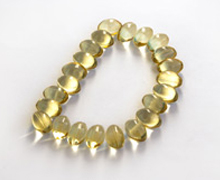
Autoimmune diseases such as rheumatoid arthritis, polymyalgia rheumatica, autoimmune thyroid disease and psoriasis are on the rise. And while there are few effective treatments, new research shows there is help on the prevention front. Researchers from Brigham and Women’s Hospital found that vitamin D supplementation was effective in their study in decreasing the risk of autoimmune diseases.
Autoimmune diseases are a leading cause of morbidity and mortality as people age and scientists were looking for ways to limit the chances of someone contracting one of those conditions. They looked at whether vitamin d and/or omega-3 fatty acids (fish oil) would be effective after reviewing data from some preclinical studies that suggested they may help.
Researchers conducted a randomized study that followed participants for five years. Those who took vitamin D or vitamin D and omega-3 developed significantly fewer cases of autoimmune diseases than those who took a placebo. Supplementation of omega-3 by itself was not associated with significantly lower incidence of auto immune diseases in study participants.
"It is exciting to have these new and positive results for non-toxic vitamins and supplements preventing potentially highly morbid diseases," said senior author Karen Costenbader, MD, MPH, of the Brigham's Division of Rheumatology, Inflammation and Immunity. "This is the first direct evidence we have that daily supplementation may reduce AD incidence, and what looks like more pronounced effect after two years of supplementation for vitamin D.
"We look forward to honing and expanding our findings and encourage professional societies to consider these results and emerging data when developing future guidelines for the prevention of autoimmune diseases in midlife and older adults," Costenbader added. "Now, when my patients, colleagues, or friends ask me which vitamins or supplements I'd recommend they take to reduce risk of autoimmune disease, I have new evidence-based recommendations for women age 55 years and older and men 50 years and older."
This study was part of a larger trial called VITAL, which was designed to test the possible preventative effects of vitamin D and omega-3 fatty acids when it comes to cancer, heart disease and stroke in people with no prior history of those illnesses. There were more than 25,000 participants in the VITAL study. The men were over the age of 50 and the women were over the age of 55.
"Given the benefits of vitamin D and omega-3s for reducing inflammation, we were particularly interested in whether they could protect against autoimmune diseases," said JoAnn Manson, MD, DrPH, co-author and director of the parent VITAL trial at the Brigham."
"Autoimmune diseases are common in older adults and negatively affect health and life expectancy. Until now, we have had no proven way of preventing them, and now, for the first time, we do," said first author, Jill Hahn, ScD, post-doctoral fellow at the Brigham. "It would be exciting if we could go on to verify the same preventive effects in younger individuals."
